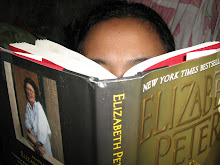I should really make it an SOP to give this out every time I get a new writer. Save us both a lot of time and heartache. *sigh*
Pointers on Writing
Read, read and read. To be able to know how to write well, you first need to be able to identify what is good or excellent writing as compared to that which is mediocre or merely passable.
Recommendations: Shakespeare, Amy Tan, J.K. Rowling, Emily Dickinson Dissect what you read. You should now be able to analyze what makes good writing good writing. Notice how Shakespeare uses words. Pay attention to Emily Dickinson’s and Amy Tan’s imagery. Analyze the flow of J.K. Rowling’s sentences and paragraphs.
Ask yourself: Why did my favorite author use this word? How did he construct his sentences?
Pick your favorite part of a book and read it aloud to yourself. Listen to the words.
Learn correct grammar and word usage. You should be able to pick this up as much from what you have read as from grammar books.
Build your vocabulary. A good writer must be able to play with words. You can’t do that if your vocabulary is limited. If a word doesn’t feel right for what you want to say, consult the dictionary and the thesaurus. Keep a grammar book on hand, too.
Pay attention to punctuation marks. The correct placement of proper punctuation is essential to getting the message across.
Pay attention to sentences and paragraphs. When you come to the end of a sentence, stop. Don’t put too many ideas in one sentence when several short sentences would work just as well.
Don’t just cut a paragraph because it looks too long or put in some more sentences because it looks too short. All sentences in a paragraph should be related to one another. Go over each sentence and see how it relates to the others, especially the ones that come immediately before and after it.
If a sentence seems out of context, it probably is. Reword it, put it elsewhere or delete it altogether. Don’t be afraid to mix and match, cut and paste, drag and drop. Try rearranging the order of your sentences to see which arrangement reads right.
Tip: If you are not contented with the way your article reads but can’t pinpoint the error, try breaking down the article sentence by sentence and checking for coherence.
Write what you understand. If you yourself only half-understand what you have written, your reader probably won’t understand it either. Your writing should be interesting but should not appear to be contrived.
Revise, revise and revise. Don’t be contented with your first draft. Read it over again. You should be able to catch the really glaring mistakes the first time around. Put it aside for a while before you read it again and shift your attention to something else. This clears your mind and helps you to view your writing with a fresh eye.
Don’t be contented with your second draft either. If it helps, read it aloud to yourself and listen for any false notes. You should be satisfied with your finished article before you hand it over for editing.
Keep in mind: An editor edits. He/she doesn’t rewrite.
Laya; CC-By-3.0-Ph
Five Dramas That Are My Equivalent Of Comfort Food, Part 2
-
So, yes, well. I've added to my "comfort dramas" list in the meantime. You
know which ones I'm referring to... the dramas you tend to go back and
rewatch w...
12 years ago











